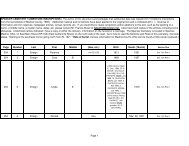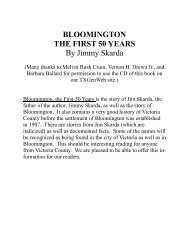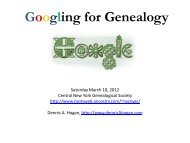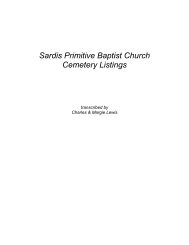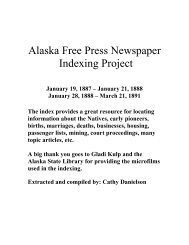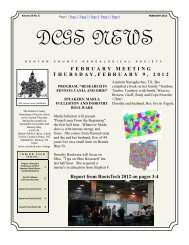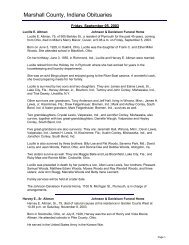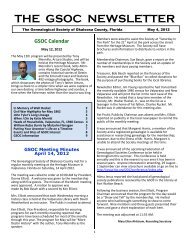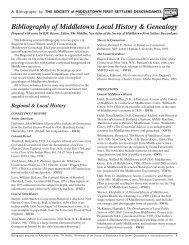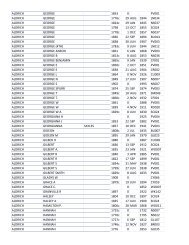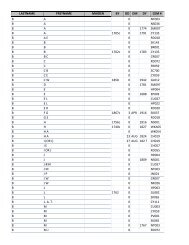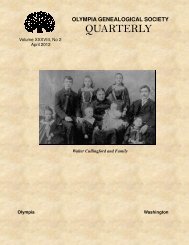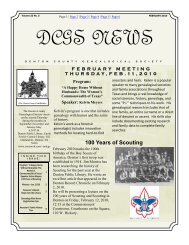June 1996 Newsletter [v5.0] - RootsWeb
June 1996 Newsletter [v5.0] - RootsWeb
June 1996 Newsletter [v5.0] - RootsWeb
You also want an ePaper? Increase the reach of your titles
YUMPU automatically turns print PDFs into web optimized ePapers that Google loves.
Whats New<br />
As you have already seen we have made some<br />
changes to our newsletter. First we have changed<br />
the name to include “Heimatbrief” meaning<br />
homeland letter or letter from the homeland. One<br />
of the purposes of this newsletter is to educate our<br />
members about the homeland with interesting<br />
articles that give you a sense of what life was<br />
like “over there”. We hope that this newsletter<br />
is like a letter from the homeland whether you<br />
feel your homeland is New Ulm, Minnesota or<br />
Muttersdorf, Bohemia.<br />
The photograph in the upper left corner is the<br />
German-Bohemian Immigrant Monument erected<br />
in 1991 by the German-Bohemian Heritage<br />
Society. The bronze statue of a man, woman and<br />
child was sculpted by a German-Bohemian,<br />
Leopold Hafner of Germany. If you would like to<br />
“read more about it” order the German-Bohemian<br />
Immigrant Monument book in the “History For<br />
Sale” section of this newsletter.<br />
We have also changed our print to a more reader<br />
friendly style that will be easier on the eyes<br />
making the newsletter more enjoyable to read.<br />
Also, we have included more photographs and<br />
images to break up the text trying to follow the<br />
saying that “one picture is worth a thousand<br />
words”.<br />
It is said that change is good. We hope you agree.<br />
Write us and let us know. LAL<br />
Our Readers Write<br />
I received my March <strong>1996</strong> copy of the G.B.H.S.<br />
<strong>Newsletter</strong> and noticed portions of my last letter<br />
to you printed in the 'Our Readers Write' column.<br />
Also noticed the town in Bohemia that my<br />
grandparents, Andreas (Andrew) Ubl and<br />
Margaret (Foraschick) Ubl came from was spelled<br />
incorrectly. Since the correct spelling of family<br />
names and town names is so important, I am<br />
requesting a correction of the town name to be<br />
printed in the next <strong>Newsletter</strong>. The correct<br />
spelling is WOTTOWA.<br />
I would also like to comment on the article 'The<br />
Village of Wasserau and the Rubey Family'. The<br />
article was Wonderful! The part that interested<br />
me the most was the part about the end of the<br />
Second World War and the expulsion of all<br />
2<br />
German-speaking people from Bohemia.<br />
I have German-Bohemian great-grandparents<br />
who emigrated from Bohemia in 1882, leaving<br />
their village of Ulbersdorf (county of Komotau) to<br />
settle in Nebraska. Ulbersdorf is located north<br />
northwest of Prague. Hollmotz cousins who<br />
remained in Bohemia were among those forced<br />
from their homes and out of the country that had<br />
been home to their ancestors for generations.<br />
Leaving Bohemia with only the belongings they<br />
could carry and with the small amount of money<br />
they had, they traveled to Germany. At this<br />
point I do not know exactly what happened to<br />
them. They ended up in an 'immigrant camp' on<br />
the Isle of Usedom, which is located directly<br />
north of Berlin on the Baltic Sea. They were<br />
apparently held there for weeks and even months<br />
before they were allowed to relocate. The<br />
conditions were not good in the camp and several<br />
of my cousins died there. They had little money<br />
and were forced to sleep on beds of straw in barn<br />
like structures. They probably were barns! I don't<br />
know if they were held there by the Germans or<br />
by the Russians as that was part of the Russian<br />
Zone.<br />
After leaving the Isle of Usedom, the surviving<br />
cousins, Adolph and Theresia and their daughter<br />
Sophia settled in one town and their son Herbert<br />
settled in another. Sophia apparently worked<br />
and cared for her parents as they were not young.<br />
(Adolph died in 1978 at the age of 88)<br />
The saddest part of their relocation is that when<br />
the Berlin Wall went up, Adolph, Theresia and<br />
Sophia were on one side and Herbert was on the<br />
other. Herbert, being in East Germany, was not at<br />
first allowed to visit his parents. By the time he<br />
became a pensioner he and his wife were allowed<br />
to ' cross over' twice a year to visit his parents. By<br />
this time Herbert had a grown son and two<br />
grandsons that Adolph and Theresia had never<br />
seen. Sophia died in 1974, leaving Adolph and<br />
Theresia old and lonely with no family to care for<br />
and comfort them.<br />
My great-grandfather, Joseph Hollmotz<br />
corresponded with his cousin Adolph for many<br />
years. After his death his daughter (my great<br />
Aunt Maxine) continued the correspondence, and<br />
after her death in 1986, I found Adolph's address<br />
and I wrote to him only to find out he had died in<br />
1978. His wife Theresia and I wrote back and


![June 1996 Newsletter [v5.0] - RootsWeb](https://img.yumpu.com/5198022/2/500x640/june-1996-newsletter-v50-rootsweb.jpg)
